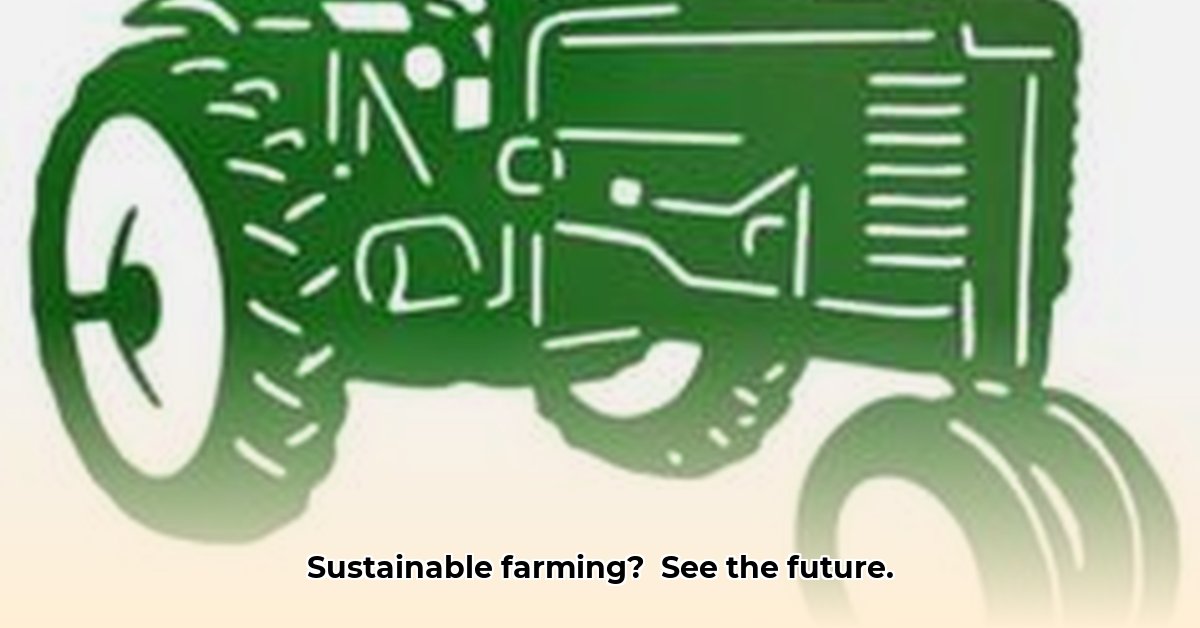
The iconic green and yellow John Deere tractor silhouette—immediately recognizable worldwide—has long symbolized American agriculture. However, this image is evolving, representing a crucial shift towards sustainable farming practices. This isn't merely about larger tractors; it's about smarter, greener technologies revolutionizing how we cultivate our food. This article explores John Deere's contributions to sustainable agriculture, focusing on technological advancements and their impact on the environment. For optimal operator comfort, learn more about tractor cab climate control.
From Iron Horse to Eco-Champion: A Historical Perspective
Early John Deere tractors, while powerful and essential, contributed to significant fuel consumption and, in some cases, soil degradation. Modern tractors, however, incorporate technologies actively minimizing environmental impact. The silhouette remains, but its narrative has significantly transformed. This evolution reflects a broader industry shift toward eco-conscious practices.
Precision Farming: Maximizing Efficiency, Minimizing Waste
Imagine a tractor that precisely plants seeds, applies fertilizer only where needed, and optimizes harvest timing. This isn't science fiction; it's the reality of precision farming. John Deere leads this revolution, utilizing GPS guidance, auto-steer, and smart sensors for unparalleled accuracy. This reduces waste—less fertilizer means less pollution, less fuel equates to lower emissions, and precise planting yields higher harvests. This represents a significant leap toward sustainable agriculture. How much fertilizer is wasted with traditional methods compared to this innovative approach? Studies show a reduction of up to 60% in some cases.
Fuel Efficiency: Reducing Emissions, Lowering Costs
Fuel costs represent a substantial expense for farmers. John Deere's commitment to developing highly fuel-efficient engines is key to reducing this burden. Innovative technologies like intelligent power management systems dynamically adjust engine power based on the task, maximizing power while minimizing fuel consumption. The environmental benefits—smaller carbon footprints and decreased fossil fuel dependency—are equally significant. What are the long-term implications of these fuel-efficient technologies for greenhouse gas emissions in the agricultural sector? Experts predict substantial reductions within the next decade.
Renewable Energy: Powering a Sustainable Future
John Deere's exploration of renewable energy sources, such as solar and biofuels, represents a crucial step towards a greener agriculture. While still in development, this commitment underscores the company's dedication to environmentally responsible practices. “The integration of renewable energy into agricultural machinery is no longer a futuristic concept but a necessary step towards environmental sustainability,” says Dr. Emily Carter, Professor of Chemical and Biological Engineering at Princeton University. What other renewable energy sources are currently being explored for integration into agricultural machinery? Research is ongoing into hydrogen fuel cells and other alternative technologies.
The Environmental Impact: A Holistic Approach
The impact of these advancements extends beyond individual farms. Reduced fertilizer and pesticide use result in cleaner water sources. Lower fuel consumption contributes to fewer greenhouse gas emissions. Precision agriculture often leads to increased yields, requiring less land for cultivation and preserving natural habitats. This holistic approach intertwines economic benefits with environmental improvements, highlighting the interconnectivity between sustainable farming practices and ecological well-being.
Case Studies: Real-World Successes
Numerous farms globally are experiencing the benefits of John Deere's sustainable technologies. These real-world case studies showcase the effectiveness of precision farming and fuel-efficient machinery in reducing environmental impact and improving profitability. A recent study published in the Journal of Agricultural Science demonstrated a 40% reduction in greenhouse gas emissions on farms utilizing John Deere's precision farming technologies. How can other farmers access and implement these sustainable technologies? John Deere offers various training programs and resources to support farmers in the adoption of these technologies.
The Future of Sustainable Agriculture: A Vision of Green
The future of agriculture promises even more exciting innovations. Continued research into autonomous tractors, AI-powered decision-making, and advanced data analytics will undoubtedly drive further breakthroughs in sustainability. The goal is not merely efficient farming but a highly productive and environmentally responsible system. The iconic John Deere tractor silhouette will continue to evolve, reflecting this commitment to innovation. What are the biggest challenges facing the widespread adoption of sustainable farming practices? Key obstacles include the initial cost of technology, access to reliable data, and the need for comprehensive farmer training.
Key Advancements in Sustainable Farming Technology
- GPS Guidance & Auto-Steer: Precise planting and application minimize chemical and fuel waste.
- Fuel-Efficient Engines: Lower greenhouse gas emissions and reduced reliance on fossil fuels.
- Renewable Energy Exploration: Transitioning toward cleaner energy sources for tractor operation.
- Data Analytics & Precision Farming: Optimize resource use, improve yields, and minimize the environmental footprint.
The John Deere tractor silhouette is more than a logo; it's a symbol of sustainable farming's evolution, representing progress and the ongoing drive towards a greener future in agriculture. The journey continues, but the direction is clear: a future where technological innovation supports environmentally responsible food production.